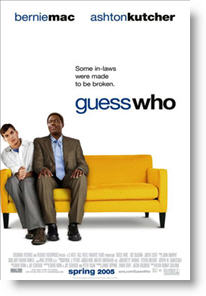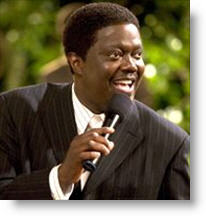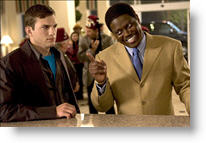Guess Who
 for sex-related humor.
for sex-related humor.
Reviewed by: Dr. Kenneth R. Morefield
CONTRIBUTOR
| Moral Rating: | Average |
| Moviemaking Quality: |
|
| Primary Audience: | Teens Adults |
| Genre: | Comedy |
| Length: | 1 hr. 37 min. |
| Year of Release: | 2005 |
| USA Release: |
March 25, 2005 |







Is inter-ethnic marriage biblical? Answer

Get biblical answers to racial hot-topics
Should I save sex for marriage? Answer
How far is too far? What are the guidelines for dating relationships? Answer
Learn how to make your love the best it can be. Discover biblical answers to questions about sex, marriage, sexual addictions, and more.| Featuring |
|---|
| Bernie Mac, Ashton Kutcher, Zoe Saldana, Judith Scott, Sherri Shepherd |
| Director |
|
Kevin Rodney Sullivan |
| Producer |
| Jenno Topping, Erwin Stoff, Jason Goldberg |
| Distributor |
“Some in-laws were made to be broken”
In preparation to review “Guess Who,” I re-watched its 1967 inspiration, “Guess Who’s Coming to Dinner.” The original film came across as dated and a more than a bit heavy-handed, a film of moral earnestness, but lacking in complexity.
One of the primary reasons for remaking a film is-or ought to be-that changes in timing allow the filmmakers to do something the originals could not. One common change might be a change in technology that allows the a film to show what a previous one could not. Another change might be in social mores or audience receptivity-changes in attitudes about the subject matter might make the culture more receptive to themes or ideas that would have been taboo in a previous generation. For that reason “Guess Who’s Coming to Dinner” is a film that—on the surface—was ripe for a remake.
In an interview in The Hollywood Reporter, Todd Haynes called Dinner star Sidney Poitier the “personification” of black themes in the 1960s that were embraceable by mainstream American cinema. Haynes said of Poitier: “He was this impeccable example of black America. He was flawless and fit into your white living room like nothing else and yet he reflected none of the conflicts that were actually going on in such enormous degrees on the streets.”
Nowhere is this sanitization of conflict under the guise of genuine engagement more prevalent than in “Guess Who’s Coming to Dinner” where Poitier plays a too-perfect-to-be-true no-possible-reason-to-explain-objections-but-racism medical doctor who has published research, donated time in the third world, made money, showed proper deference to his in-laws, demonstrated fidelity to a previous wife and child (that died in an accident) and gallantly refused to bed his new love until he is certain that she won’t be hurt by a break up precipitated by her family’s possible rejection of him.
“Guess Who’s Coming to Dinner” was about white America “accepting” black America, but ultimately what was accepted or endorsed was a very narrow vision of black America. Given the racial tensions in America in the 1960s, perhaps there was a benign purpose in domesticating the representation of black anger on the screen as a means of showing that whites need not be afraid of full integration, but that domestication made the subsequent integration look more like assimilation than acceptance.
I would like to think that America in general, and American Christians in particular are now capable of a deeper examination of race. I would like to think that we are capable of understanding that some anger is deeply rooted in the experience of oppression and that to acknowledge its existence and legitimacy might be a more productive step towards true integration than a begrudging endorsement of interracial marriage.
If “Guess Who” had had the courage to actually remake “Guess Who’s Coming to Dinner,” it might have been one of those rare remakes that improved on the original precisely because the ground that was broken by the original has borne the fruit of more diverse and complex examinations of the subject matter. In addition, there is a long history-from Juvenal to Swift to Lubitsch-of art being able to address through comedy issues that might be too incendiary for an audience to accept in drama.
The problem, though, is that despite its title, “Guess Who” is not a remake of “Guess Who’s Coming to Dinner.” It is a remake of “Meet the Parents.” And there is no discernible reasons why we need another version of that film. Despite some surface similarities, “Meet the Parents” is the antithesis of “Guess Who’s Coming to Dinner” in that the humor comes from the utter arbitrariness of the in-laws’ rejection. It is possible to laugh at the discomfort that Ben Stiller or Ashton Kutcher feel in the cold responses of Robert De Niro’s or Bernie Mac’s characters because we know, as do they, that this rejection is generic and arbitrary.
“Guess Who” tries to substitute a universal experience (rising nervousness in the face of wanting to make a good impression) for a more narrow one (having to deal with race prejudice) while retaining a sheen of moral seriousness from a subject that it is no longer being portrayed.
At one point Theresa, the young black woman who has brought home her white fiancé, asks her sister how their dad is handling the situation. “Dad’s a bit on edge,” is the reply, “but no more than usual.” The “no more than usual” is the give away. The film portrays a prickly man, not a racist man, coming to terms with change. This point is reinforced when Theresa’s father, Percy (Bernie Mac) tries to check his daughter’s boyfriend, Simon (Ashton Kutcher) into a hotel. When Percy lets slip that there is a reservation already made, Simon asks, puzzled, “You knew you were going to kick me out [of the house] last week?” Percy replies, “I knew I was going to kick you out twenty-four years ago-when I had a girl.”
Those objections aside, there are elements of the film that work. Simon and Theresa have real chemistry together, a chemistry that Poitier’s and Katharine Houghton’s characters lacked in “Guess Who’s Coming to Dinner.” We get to see Simon and Theresa interact, albeit briefly, before they arrive at the parents’ home, and the young actors’ ability to make these likeable characters (demonstrating credible affection) elevates the film from an intellectual exercise to a story about two specific people. I imagine merely seeing Simon and Theresa interact in a loving manner will present a greater challenge to bigotry than ten speeches similar to what Spencer Tracy delivers at the end of Dinner.
The modern film also appears to realize that straight-forward racism is a bit boring. There is no position for a film to take about it except repudiation. “Guess Who” is actually pretty sharp about portraying the various ways people use various things, race among them, in order to try to gain the upper hand in a relationship. It also tones down the moral indignation long enough to let the characters laugh at themselves, not just others.
If Christians end up objecting to the film, it will probably be for the sexual ethics/mores presented in the film. It is clear that Theresa and Simon are sexually active, although their interaction onscreen is limited to kissing and suggestive dialogue. Theresa and her sister rather crudely mock sexual stereotypes by discussing the relative sizes of male sex organs and power of sexual climaxes.
Less blatant, but perhaps equally questionable, is Percy’s advice to Simon that the key to a good marriage is admitting that the woman is “always right.” While this advice might be superficially similar to the sacrificial love that would be advocated in a Christian world view, Percy’s foundational logic-that whichever member of a relationship desires the other more is in a position of vulnerability and must accept the terms and conditions of the other-left me wondering whether the film’s definition of a good relationship was a carefully considered one.
“Guess Who” is at heart is a romantic comedy, not a social drama. Perhaps the biggest evidence that racial attitudes have changed in this country is that the film has to manufacture a clumsy subplot about Simon quitting his job in order to provide what little tension there is that the principals might not get together. At no time do we ever really fear the relationship is in jeopardy, either from without or within. But, then again, neither do we really want it to be. So perhaps the most interesting thing about “Guess Who” is its inability to convince the audience that interracial marriage is a big deal. That could mean the film lacks imagination, or it could mean that society is growing more tolerant. Maybe it is a little bit of both.
My Grade: B-
See list of Relevant Issues—questions-and-answers.


There are more than a few curse words. The message of the movie that color should have nothing to do with love is wonderful. The relationship between the girls parents relationship is a bit odd, in how they fight and make up. It may just be the culture that I have not been a part of, that we don’t understand. They do drink hard liquor in 3 different scenes. We laughed through out the entire show. As adult entertainment we would give it a 4. As a family movie we would give it 3½, with a caution not to take young children.
Average/3½
Moral rating: Very Offensive / Moviemaking quality: 3
The one redeeming value of the film is the message of “seeing people, not color.” While it could be funny at times and mildly entertaining, the overall affect for me was not worth the time or money invested. And above all, it was not something I would have knowingly allowed my teen to see. I have learned my lesson!
Offensive/2½
Average/3
Average/4


My Ratings: Average/3½